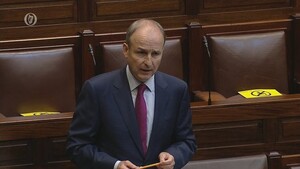From top: A scene from Season 2 of For All Mankind; Heber Rowan
The recent conclusion of Apple TV’s “For all Mankind” highlighted the potential for war in space. Yeah, you read that right. Space wars.
So without giving spoilers of the excellent series, I’d like to take a moment to discuss space policy and what it means for us going forward. I will examine the questions of ‘is it worth it?’ and what a colonised Mars would mean.
Donald Trump’s presidency created a new branch of the US military, The Space Force. Now to my mind that just sounds ridiculous. Space exploration is a broad international effort based on collective interest in progressing our fortunes among the stars. At least that is what I have been raised to believe looking at the shuttle launches as a child and equally enthralled as an adult watching the developments at SpaceX.
We are getting there, among the stars that is. It’s not over the top to say that with rocket technology and artificial intelligence improving people are getting hopeful. With most eyeballs focused on America’s space programme not China’s, we are rolled up into the idealistic soft power image of America being the place with the best and brightest.
Sadly, in noting that, I am reminded of the ‘Victorian Summer’ of the antebellum period in which western society believed in the progressive development of technology as something that would inherently end all future suffering. How wrong that idea was…
What’s the worth?
The problems of society’s inequality and tackling climate change are a challenge. Can we have equality, growth and reduce our impact on the environment. The standard answer is: no.
Instead of looking at Earth’s direct issues, Elon Musk and Jeff Bezos are now looking to the stars and aiming for a multi-planetary expansion of humanity. Inspirational perhaps. Personally, I love the idea of ‘pushing the envelope’ and doing more with the motivation of a scientific transcendence that is space travel.
Though it reminds me of the person who goes off for a ‘gap year’ wandering in south east Asia thinking that a bit of travelling will solve all of their underlying personal problems by the ‘horizon opening’ of travel. While the novelty of travel can be great for a period, eventually what was once new, can become dull, familiar.
Looking at the complexities of the problems our children will face, we have to think of ‘our own houses in order’. That to invest the efforts of great minds building rockets and trillions in the pursuit of space, we have to stop and think about getting our Earth working well first. Not easy.
Yes, going to space provides us with a valuable external goal that inspires others to search for more and do more than plain old earth can manage, yet I’d argue it would be great if the benefits weren’t also additions to a military industrial complex. That said, there are technological innovations from the blue sky research that is space exploration. Sometimes the demand for immediate results stymies innovation.
That said: don’t kid yourself, Elon Musk is invariably helping the hegemony of America to stay the master of the skies. To take an international relations angle that is. Joe Biden has not disbanded the new ‘Space Force’ and I doubt he will. There is too much to gain by ripping up the outer space treaty of the UN and viewing the juicy asteroids as ‘terra nullis’ mines ready for exploitation. These are the things that matter for the next century. At the current rate of development, I believe it could well be possible for such a development. The rubble of one is currently on its way back to Earth only recently.
To green Mars or not? That is the trillion dollar question.
Essentially, it’s about deciding if there is something intangible and sacred about Mars left as it is or terraforming it for humanity’s benefit. In the famous Mars trilogy of hard science fiction, Kim Stanley Robinson depicted that very debate in detail showing those in the ‘Red Mars or Green Mars’ camps fighting out over keeping Mars as it is or changing it.
I’d argue that when we consider the future politics of space travel and military policy, not caring about polluting another planet with our germs and terraforming is a big deal. The debate might take 50 years for it to properly happen, though I believe it is going to happen eventually the way we are headed. So we should start talking about it. Now.
Even if life isn’t found on Mars, there is still the fundamental question to be asked about the morality and indeed the economics of it all. Is it actually worth it on so many levels rather than just a ‘we do it because it is hard’ attitude. Wiser minds will undoubtedly examine these very questions philosophically and ethically in the years to come.
Elon Musk suggested that the polar ice caps of Mars could be melted with a nuclear detonation in order to start the change in the atmosphere to allow human colonisation of the planet. As cool as that would be to see in some ways… it is something else to have a billionaire get their hands on weapons of mass destruction in the name of ‘the greater good’. Troubling.
The aforementioned outer space treaty of the UN prevents nation states and private companies from getting unique control on celestial bodies. Essentially, we all have to share whatever is out there and do what we can to share what we learn in the process of discovering how to get there in the first place.
The protection of life is built into it all also so that’s why the Mars rover and any other craft landing among the heavens undergoes a sterilisation procedure. No germs, no trace of Earth’s life to save whatever life big or small might be there. There indeed could also be a risk of exotic germs coming back to Earth and killing many.
When we weigh up the long term survival of the human race on Earth against upholding a principle of not harming another planet and its potential life, many figure, it is not worth it. Nuke those icecaps!
It is the argument essentially that we can’t hope for biological equilibrium on Earth with the standard of living that we have now against the draw of a blank canvas. A ‘red one’ if you will.
Though as we all know, the best of intentions can often have the worst of outcomes. If you stop the rehabilitation of an ill person by feeding them in bed everyday, one day they might find that they can no longer walk. Good intentions can be harmful, just like too much bedside feeding of that ill person.
There is so much that will and can change in the next 50 years. The prospect of a multi-planetary society can be a reality with the right motivation and resources put behind it. Thousands even millions may want to go to this new horizon with the vigour of adventure.
The inherent value of a dusty planet seems hard to compare to green Earth. Even while it is treated as a doormat. In writing this, I am reminded of the clarion call for environmental protection by Chief Seattle in his letter to US President Pierce:
‘If we do not own the freshness of the air and the sparkle of the water how can you buy them? Every part of this earth is sacred to my people. Every shining pine needle, every sandy shore, every mist in the dark woods, every meadow, every humming insect, all are holy in the memory and experience of my people. We know the sap that courses through the tree as we know the blood that courses through our veins. We are part of the earth and it is part of us.’
The new society
If we colonise Mars and have private space companies mine its surface, we may devalue the dust of Mars itself by seeking a price from it. Yes, getting to Mars is going to be extremely expensive, hazardous and something those who pay for it all will want some profit from it.
Mars could in time be its own country and society. Only time will tell. The main thing is how it gets started. What principals and ideals are instilled in those who will one day call it home when robots become redundant on its surface? If commercial or national interests get ahead of any spirit of international cooperation and a value for Mars being left as ‘red’.
Trade between Earth and Mars could benefit both though once the balance tips as Mars becomes self reliant, if possible, conflict may ensue. The US ‘Space Force’ may be engaged to fight on the dusty surface of Mars to stop a Martian independence movement. Right now, such thoughts are the subject of science fiction novels though not without a basis in probability as we look forward.
Earth has, in my view, yet to have its watershed moment of a complete systems change for environmental change and a genuine hunger for immediate all hands on deck, drive to colonise Mars. Speeches by Greta Thunberg can only do so much. So this debate of the principals of being a ‘green martian’ or ‘red’ are academic for now. We aren’t going there yet. Indeed it may be 2030 before there are boots on Mars.
Though if this question can do anything for us now, it is the thought provoking aspect of what is it that we value on Earth and idealistically if we could create a new society elsewhere, what would it be like?
As we get out our telescopes and eye the frosty red ball that is Mars, we dream of a different world. The reality is though any new society we make there will be shaped heavily by the one it came from. Flawed.
Heber Rowan is a Sligo native with a passion for politics. He works in public affairs and enjoys listening to and narrating audiobooks. He can be found on Twitter and occasionally blogs on Medium.com.
Pic via Apple TV














